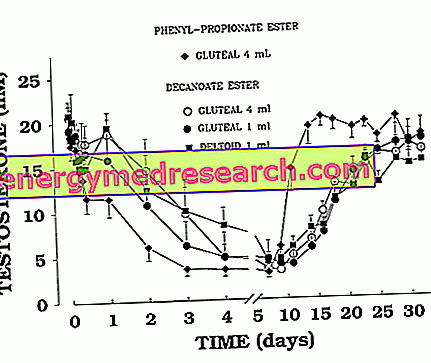
Information on ALC eurosup
Food supplement of acetyl L-carnitine.
FORMAT
100 cps bottle
COMPOSITION
Acetyl L-Carnitine hydrochloride: stable salt of the active ingredient
Anti-caking agents: silica, magnesium stearate
capsule: edible gelatin
dye: titanium dioxideOne capsule contains
Acetyl - carnitine 200mg (ALC): it is one of the most abundant acyl derivatives of L-carnitine, which is mainly synthesized in the kidneys, liver and brain, starting from two essential amino acids such as lysine and methionine, therefore stored mainly in the muscle and heart . Deficiencies of these two amino acids, consequently also of carnitine, could occur in poorly balanced vegetarian or vegan diets, also bearing in mind that the finished carnitine is found mainly in meat such as beef and veal.
The carnitine introduced through the diet has very high absorption levels, with bioavailability of between 75 and 80%; these percentages drop to around 43% for the acetylated form in the form of supplement, and up to 14 - 18% for the simple L carnitine (supplement).
The key role of carnitine is to guarantee the transport of fatty acids within the mitochondrial matrix, favoring their oxidation and preventing the harmful accumulation of acetyl-CoA. Furthermore, acetyl L-carnitine, due to its increased lipophilicity, ability to cross the blood-brain barrier and for its mimetic colander action, also plays an important role in safeguarding neuronal function.
The potential of this molecule is therefore different:
- Optimization of lipid metabolism
- Optimal recovery of post-work out muscle glycogen reserves
- Strengthening of aerobic and oxidative properties of muscle cells
- Therapeutic applications in various diseases
- Enhancement of cognitive functions.
Product features ALC eurosup
The product looks like many other supplements based on acetyl L carnitine. The pharmaceutical form chosen is that of the capsules, which preserve the integrity of the product from oxidative and deteriorating processes.
Recommended use by the company - ALC eurosup
Take one cps a day in a little water.
Mode of use in ALC eurosup sports practice
Supplementation with ALC in sports practice involves different protocols and different timing of administration. Commonly the dosage is between 500mg and 2500mg per day, taken with an increasing or decreasing trend from week to week. In order to avoid waste of material (low absorption in the intestine and increased clearance in the kidney), the highest doses are divided more or less evenly throughout the day. The opinions regarding the timing of employment are different. In most cases it is recommended to take it away from meals and before training; however, scientific studies show that the maximum blood concentration is reached approximately 4 hours after oral administration and data on bioavailability show that the absorption of food carnitine is much higher than the integrative form. A common mistake is to assume that the activity of this molecule takes place immediately after absorption at the intestinal level; in reality, what counts for metabolic purposes is tissue availability, which appears to be promoted by controlled hyperinsulinemia.
Rationale for use - ALC eurosup
Although there are numerous studies showing a real therapeutic efficacy of ALC in various pathological conditions - from neuronal problems to Alzheimer's disease, from multiple sclerosis to oxidative damage - its role in sports is unclear.
Interest in recent studies has shown the ability of this molecule to preserve and enhance the oxidative character of type I muscle fibers in soleus muscles of rats, subjected to stress and not, thus highlighting a possible effect in improving aerobic capacity.
ALC eurosup side effects
At high doses episodes of insomnia, nausea, abdominal cramps, migraine and gastro intestinal disorders may occur, albeit rare.
Precautions for using ALC eurosup
Contraindicated in cases of renal, hepatic, diabetic, pregnancy, lactation, mood disorders.
This article, elaborated on the critical re-reading of scientific articles, university texts and common practice, is for informational purposes only and is therefore not a medical prescription. It is therefore always necessary to consult your doctor, nutritionist or pharmacist before starting to use any kind of supplement . Further information on the critical analysis of ALC eurosup.
| BIBLIOGRAPHY |
Applied metabolics - vinegars l carnitine. J Physiol. 2007 June 1; 581 (Pt 2): 431-44 New insights concerning the role of carnitine in the regulation of fuel metabolism in skeletal muscleFrancis B Stephens, Dumitru Constantin-Teodosiu, and Paul L Greenhaff Ann NY Acad Sci. 2004 Nov; 1033: 30-41. Kinetics, pharmacokinetics, and regulation of L-carnitine and acetyl-L-carnitine metabolism Rebouche CJ. Gastroenterology. 1986 Jul; 91 (1): 10-6. Carnitine transport in human intestinal biopsy specimens. Demonstration of an active transport system. Hamilton JW, Li BU, Shug AL, Olsen WA.Clin Pharmacokinet. 2003; 42 (11): 941-67. Pharmacokinetics of L-carnitine. Evans AM, Fornasini G.J Appl Physiol. 1988 Jun; 64 (6): 2394-9. Influence of carnitine supplementation on muscle substrate and carnitine metabolism during exercise. Soop M, Björkman O, Cederblad G, Hagenfeldt L, Wahren J.Carnitine for fatigue in multiple sclerosis. Tejani AM, Wasdell M, Spiwak R, Rowell G, Nathwani S. Cochrane Database Syst Rev. 2010 Feb 17; 2: CD007280. Effect of different chronic intermittent stressors and acetyl-l-carnitine on hypothalamic beta-endorphin and GnRH and on plasma testosterone levels in male rats. Bidzinska B, Petraglia F, Angioni S, Genazzani AD, Criscuolo M, Ficarra G, Gallinelli A, Trentini GP, Genazzani AR. Neuroendocrinology. 1993 Jun; 57 (6): 985-90. Biofactors. 2010 Jan; 36 (1): 70-7. A DIGE approach to the assessment of rat soleus muscle changes at loading: effect of acetyl-L-carnitine supplementation. Moriggi M, Cassano P, Vasso M, Capitanio D, Fania C, Musicco C, Fish V, Gadaleta MN, Gelfi C. |



